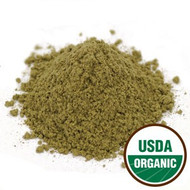Eherbz: Organic Sage Leaf Powder - A Blog
Mar 3rd 2021
Throughout history, mankind have devised several traditional remedies to illness and diseases, from plant based and even to the extent of using animal parts to treat several illnesses. Many have stood the test of time but only few are still being used in the modern times. A substantial percentage of the world's population still use home remedy using herbs and what nature can offer, even using a salt that's being excavated under the mountains. One of those is Sage Leaf, and here we will discuss its history, benefits and uses.
Sage: Salvia officinalis
Sage, also known as garden sage, common sage, or culinary sage, with its scientific name Salvia officinalis has been used since the ancient times for warding off evil, snakebites and even increasing women's fertility. Sage was also referred as the "holy herb" by the Romans and they employed it in their religious rituals. A member of the mint family Lamiaceae and a native to the Mediterranean region, it is a perennial, evergreen subshrub, with woody stems, grayish leaves and blue to purplish flowers. Because of its strong aroma and earthly flavor, the sage has been used in several aspects such as in culinary as spice, and infused in some products in a form of an essential oil.
Benefits of Sage
Due to its high content of several nutrients, sage have plenty of benefits. For starter, sage is loaded with Antioxidants the help fortify our body's defenses, which neutralize potentially harmful free radicals that are linked to chronic diseases. Sage also contains chlorogenic acid, caffeic acid, rosmarinic acid, ellagic acid and rutin, which are linked to impressive health benefits. It also contains antimicrobial effects that neutralize microbes that promote dental plaque. Mouth wash sage-based has shown effectively kill the Streptococcus mutans bacteria, notorius for causing dental cavities, and it also halts the spread of Candida albicans, a fungus that may also cause cavities. Other benefits include may include reduces menopause symptoms, it also reduces blood sugar levels and improves insulin sensitivity with similar effect as rosiglitazone, which is another anti-diabetes drug. Sage may also help support memory and brain health, lowers Bad LDL cholesterol and sage may also protect against certain cancers. These are just some of the many benefits of Sage, although they may be promising, use sage to treat certain illnesses with caution and you may consult a physician.
Sage in Culinary
Apart from being used as treatment due to its medicinal properties, it is also popular in the culinary world as a spice. In Britain, for generations it has been listed as one of the essential herbs together along with parsley, rosemary, and thyme, because of its savory, slightly peppery flavor. In the 14th and 15th centuries, it has appeared in "Cold Sage Sauce" which is known in French, English and Lombard cuisine, traceable to its appearance in Le Viandier de Taillevent. When fresh, you can use sage to improve the flavor of your dish, you can sprinkle it as a garnish on soups, even mixing it into a stuffing of a roast dish. You can even combine chopped sage leaves with butter to make sage butter, add chopped leaves to tomato sauce, and even serve egg omelet with sage leaves. In some aspects, sage leaves are dried and grounded and used as seasoning, and can be used in meats and adding taste to any dish. Apart from being used as a seasoning, in the Levant and Egypt, sage is commonly used a flavor for hot black tea, or boiled and served as an herbal drink in its own right.
For more information, visit: https://eherbz.com

